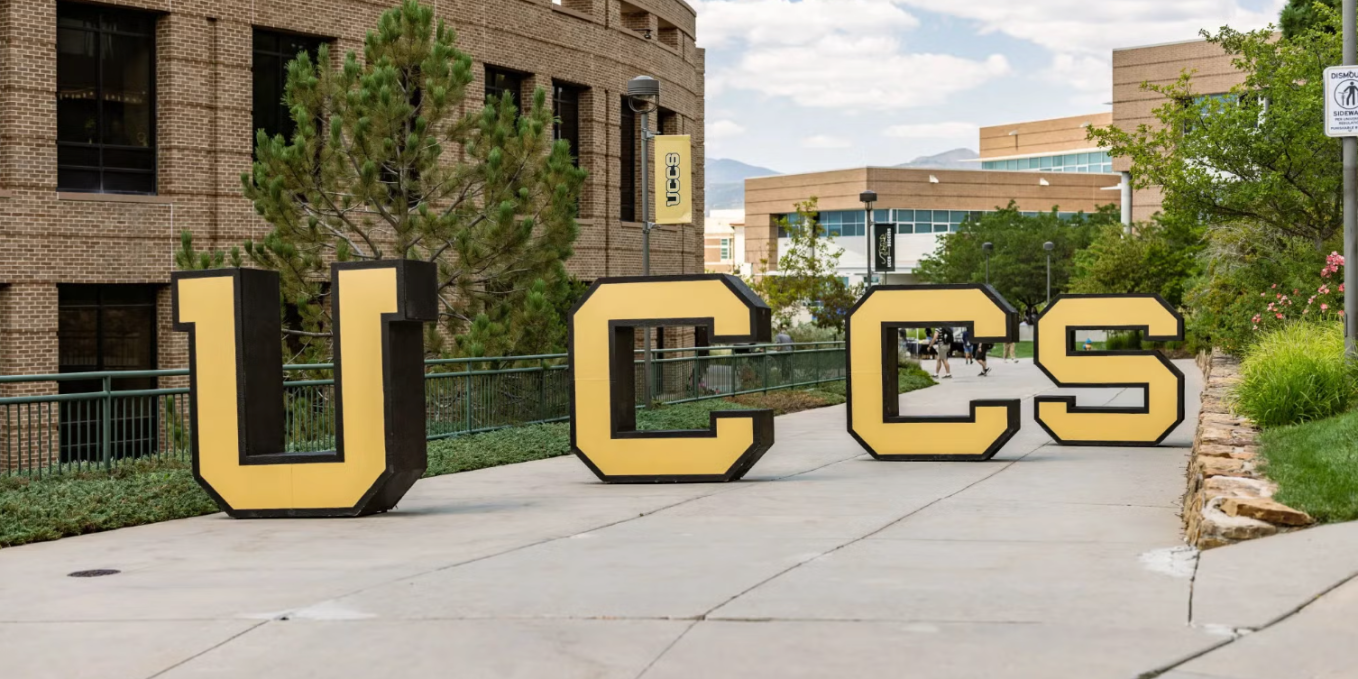
Curriculum & Instruction, MA
Request Information
Online Master of Arts in Curriculum and Instruction Overview
Earn a flexible master's degree to advance your education career.
The online Master of Arts in Curriculum and Instruction develops skilled professionals who inspire excellence and drive transformative change in the schools and communities they serve. We achieve this goal by fostering scholarship, achievement, and service through collaborative partnerships. Our approach involves promoting and modeling innovative, ethical, and research-based practices while embracing principles of inclusion and social justice.
The philosophical foundation of the Master of Arts in Curriculum and Instruction is designed to provide professional educators with increased knowledge of current research on teaching and learning and its contexts and to apply that research in practice. Students in the program have the opportunity to focus on an area of interest to develop increased skills and knowledge in that area.
This program offers two emphasis areas: Instructional Technology and Gifted and Talented.
-
Offered byCollege of Education
-
Format100% OnlineDelivery
-
Cost Per Credit$737**Approximate In-state
-
Cost Per Credit$841**Approximate Out-of-state
-
Application DeadlineMay 1, 2026Priority Application Deadline
-
Rolling AdmissionsRolling AdmissionsApplication Deadline
-
Credit Hours36Credit Hours
-
Time To Completion2 YearsAverage Completion Time
MA in Curriculum and Instruction Course Overview
The Master of Arts in Curriculum and Instruction is a 36-credit-hour program designed for licensed, practicing teachers who desire to continue developing their professional expertise. Three specialization tracks are available in Instructional Technology and Gifted & Talented Education.
Complete a core of coursework requiring:
- Examination of educational issues from the perspective of social context and culturally responsive pedagogy
- Investigation and analysis of curricular design and models of teaching
- Examination and analysis of seminal and current research and application of research in instructional settings
- Consideration of the role and uses of technology in curriculum & instruction
- Understanding of historical, philosophical, psychological, cultural, and social foundations of curriculum & instruction
- Development of skills related to your emphasis in Instructional Technology or Gifted & Talented Education
-
The Gifted & Talented Education emphasis program prepares teachers at all levels to excel in teaching Gifted and Talented students (PK-12).
The program course sequence meets Colorado Department of Education (CDE) requirements for the Gifted Education endorsement. This program does not meet requirements for an initial teaching license. Learn more.
Gifted and Talented Education Course Options
- CURR 5201: Foundations in Gifted Education
- CURR 5202: The Assessment & Identification of Gifted & Talented Students
- CURR 5203: Psychology of the Gifted: Social, Emotional Needs, and Special Populations
- CURR 5204: Under-identified and Under-served: Giftedness in Poverty & Culturally Diverse
- CURR 5206: Creativity in Gifted Education
- CURR 5211: Curriculum Models & Aligned Programming for Gifted Students
- CURR 5214: Differentiated Instruction and Research-based Strategies for Teaching the Gifted
- CURR 5215: Gifted Program Leadership
- CURR 5230: Gifted & Talented Practicum
-
The Instructional Technology emphasis prepares teachers at all levels to use technology to enhance their teaching methodologies and reach the next generation of learners, who expect to learn using technology.
You’ll learn about the foundations of instructional technology, best practices in online teaching and learning, instructional design principles, using multimedia to develop interactive lessons, and artificial intelligence in education settings. Learn more.
Instructional Technology Course Options
- CURR 5170: Introduction to Technology in Education
- CURR 5171: Foundations of Instructional Technology and Online Teaching
- CURR 5172: Multimedia for Educators and Trainers
- CURR 5174: Artificial Intelligence for Educators and Trainers
- CURR 5175: Capstone Project in Instructional Technology
-
Students who start in theAlternative Licensure Program but later decide not to pursue licensure may complete the general MA in Curriculum & Instruction by counting ALP core courses toward their cognate and/or electives and completing the rest of the MA core.
- CURR 5004: Schools, Society & Diversity
- CURR 5005: Educational Psychology
- SPED 5001: Introduction to Special Education
- CURR 5700: Introduction to ESL
- CURR 5014: Instructional & Classroom Management Strategies I
- CURR 5016: Instructional & Classroom Management Strategies II
-
- CURR 5002: Issues, Strategies, & Models in Curriculum Design
Designed to prepare students to write challenging, differentiated, and effective curricula for a variety of learners. A variety of curriculum models and strategies will be explored. - LEAD 5700: Introduction to Research and Statistics
Introduces concepts and skills related to educational measurement, critical evaluation of published research, quantitative and qualitative research design, program evaluation, basic statistical analysis, and qualitative data collection and analysis. Field work is optional. - CURR 5090: Master's Research Project
During this course the student will complete a research paper/project which investigates a topic of specific interest to the student under the guidance of the faculty member. This project serves as the comprehensive exam for the Curriculum and Instruction master’s degree.
- CURR 5002: Issues, Strategies, & Models in Curriculum Design
-
- CURR 5000: Foundations: History & Research in Curriculum Studies
- CURR 5002: Issues, Strategies, & Models in Curriculum Design
- LEAD 5700: Introduction to Research & Statistics
- CURR 5090: Master's Research Project(Final Project)
Curriculum & Instruction Career Data
Lightcast projects jobs for graduates with a degree in Curriculum and Instruction will grow 8.6% from 2024 through 2028 for the Colorado Springs area.
Graduates are equipped to do work like:
- Instructional design
- Authoring learning materials and textbooks
- Leading public, private, and other academic programs
- Contributing to government education departments
- Teaching English to speakers of other languages (TESOL)

$67,740
$67,740
Instructional Coordinators
$67,424
$67,424
Postsecondary Teachers
Data retrieved from Lightcast; Top related occupations in Colorado Springs, Colorado, based on the salary of the 50th percentile of workers (50% of employees make this salary or less).

Complete the form on this page to be contacted by an Enrollment Navigator.
Tuition and Fees
At UCCS Online, we strive to keep our tuition costs affordable so that you can get a world-class education that fits your budget. When you earn a degree, you’re not simply getting a diploma — you’re making a lifelong investment in yourself and empowering your future career. We know that affordability is an important factor, and that’s why we’re here to help you explore all of the options available to fund your education.
Our Enrollment Navigator can answer any of your questions about tuition and financial aid, help you take care of the paperwork, and make sure you’re able to focus on reaching your goals. From financial aid and scholarships to tuition assistance programs, we’ll work with you to find the best way to finance your degree.
Complete the form on this page to connect with our Enrollment Navigator and get more information about tuition, fees, scholarships, and financial aid.
Western Regional Graduate Program (WRGP/WICHE)
Students from the following states (Alaska, Arizona, California, Colorado, Hawaii, Idaho, Montana, Nevada, New Mexico, North Dakota, Oregon, South Dakota, Utah, Washington, Wyoming and the U.S. Pacific Territories and Freely Associated States) have the opportunity to pay a reduced tuition rate which is currently equal to in-state tuition.
-
We know that affordability is an important factor, and that’s why we’re here to help you explore all of the options available to fund your education. Our enrollment navigators can help answer any of your questions about financial aid resources and make sure you’re able to pursue your goals. From financial aid and scholarships to transfer credits and corporate tuition assistance programs, we’ll work with you to find the best way to finance your UCCS Online degree. Complete the form on this page to be contacted by an enrollment navigator.
-
Financial aid is available for eligible students to use toward paying educational costs while enrolled in a UCCS Online program. To determine your eligibility and apply for financial aid, you’ll need to fill out the Free Application for Federal Student Aid (FAFSA). When you submit your FAFSA, you will be considered for three types of aid: grants, work-study, and student loans. To be considered for federal financial aid, you will need to apply early and annually.
- Scholarships | You may be eligible for scholarships at UCCS. We offer many scholarships and grants to students who are ready to earn their degrees and achieve success. Between both UCCS-offered and external scholarships, our students earned more than $10 million in scholarship awards last year alone.
-
UCCS Online is military-friendly and committed to providing service members and their families with a high-quality education that fits their distinct needs. As a UCCS Online student, you will have access to UCCS Veteran and Military Affairs, which connects veteran, active duty, reservist, National Guard, and dependent students with fundamental support, services, and resources to ensure academic and professional success. UCCS is a proud home campus to many veteran and military students.
Eligible veteran and military students may use veteran benefits, military tuition assistance, and/or financial aid to pay for their education. Military benefits with UCCS Online include:
- Waived application fee for active duty and veterans
- Military benefits approved program
Connect with our Enrollment Navigators to learn more about the benefits and financial assistance available to military and veteran students.
-
All students are automatically opted in to the TAAP program with the choice to opt out. The TAAP program provides all your course materials for one flat fee per credit hour. That means no more time spent searching for, ordering, and paying out of pocket for your own course materials.
-
Many companies offer tuition assistance benefits as part of their employee compensation program. Generally, these policies determine a set number of credit hours per year that the company will fund on behalf of the student/employee. Some policies place a cap on eligible tuition dollars and related expenses while others reimburse employees on a per-credit-hour basis. Get in touch with your organization's human resources department to learn more about your educational benefits.
In State Cost Per Credit:
In State Cost Per Credit:
$737
Approximate tuition per credit hour based on the number of credits taken
Out of State Cost Per Credit:
Out of State Cost Per Credit:
$841
Approximate tuition per credit hour based on the number of credits taken

Admissions Information
Master's degree candidates must demonstrate practical knowledge in the field of teaching, along with the research skills and practices necessary for graduate-level work. To be considered for admission into the MA in Curriculum & Instruction, applicants must:
- hold a baccalaureate degree from a regionally accredited four-year institution of higher education
- complete and submit a program application and application fee
- document through official transcripts a minimum GPA of 2.75 for completed undergraduate work and 3.0 for graduate work
- Postal Services:
UCCS Office of Admissions
1420 Austin Bluffs Parkway
Colorado Springs CO 80918-3733
Electronically: ugapp@uccs.edu
For other documents if needed: gradinfo@uccs.edu
- Postal Services:
- submit a goals statement of two pages double-spaced that describes why you have applied to your program and want to be a professional educator
- participate in professional interviews with the department chair or department faculty
- schedule an advising appointment with department chair or department faculty
- submit one letter of recommendation from a professional you have worked or studied under
- complete the Tuition Classification Form
- complete a background check or provide unofficial copies of all professional educational/teaching licenses
- upload your curriculum vitae or professional résumé, including relevant paid work and volunteer experience where applicable
For more details on the admission process, please visit the Admission Details page.
Start the application process by filling out the form on this page.
-
- GPA: Maintain a 3.0 GPA in all coursework throughout the program, including coursework taken outside the College of Education.
- Cognate Emphasis Areas: Students may choose to emphasize coursework for their 15-credit cognate emphasis area in one of the following areas:
- Gifted & Talented Education
- Instructional Technology
-
Depending on the program, there are three-course delivery possibilities: in-person, online, and/or hybrid.
-
UCCS accepts applications throughout the year through a rolling admissions process. However, submitting your application by the preferred deadlines is advisable.
- Spring 2026: January 20
- Summer 2026: June 15
- Fall 2026: August 24
- Spring 2027: January 19
- Summer 2027: June 14
- Fall 2027: August 23
-
- Fall 2025 - August 25, 2025
- Spring 2026 - January 20, 2026
- Fall 2026 - August 24, 2026
- Spring 2027 - January 19, 2027
-
MA candidates may request (to department chair or program coordinator) to transfer in up to nine (9) semester credits of graduate course work from a regionally accredited, four-year institution of higher education if the course work is deemed to be appropriate for the MA in Curriculum & Instruction.
All transfer requests must officially document grades of 3.0 or higher to be transferred. MA candidates must supply course catalog descriptions and course syllabi for all requested transfer coursework.
-
- English Proficiency must be demonstrated by providing evidence of an IELTS score of 6.5 or above, a TOEFL score of 550 (paper-based) or 80 (internet-based), or a Kaplan International Tools for English (KITE®) score of a minimum of 460. Students may make arrangements to take KITE® at the Global Engagement Office.
- Applicants with any post-secondary course work from an international higher education institution that is recognized by their country's Education Ministry must submit a course-by-course foreign degree evaluation by a member of NACES (National Association of Credential Evaluation Services http://www.naces.org/members.htm) or AICE (Association of International Credential Evaluators, https://aice-eval.org/).

Earn an education that creates opportunity. Start the admissions process with an enrollment navigator by filling out the form on this page today.
Frequently Asked Questions (FAQs)
-
We’re here to help. We emphasize to all students that faculty members are here for them. As faculty seek to connect with you, feel free to use their flexible office hours or contact them if you need additional help.
A common barrier to success is time management, especially if you are working a full-time job. The online format offers more flexibility and the opportunity to develop better balance among your commitments, but having a plan for completing your studies each week can help you get on track to success early.
-
Online courses at the University of Colorado are taught by the same professors that teach in-person classes. This ensures that you are receiving the same education and learning experiences as on-campus students. The primary difference is with the delivery format. Your online courses will all be taught in Canvas, the Learning Management System (LMS). You will be responsible for logging in, accessing course content, and completing any requirements of the course.
-
The Master of Arts in Curriculum and Instruction has a fully online option, which means you will not be required to take courses at our campus and there are no on-campus components to this program.

UCCS Online is a pioneer in distance education. Since offering our first online course in 1996, we have grown to provide the people of Colorado and the United States with high-quality, engaging online degrees and certificate programs. Now it is your turn to discover what you can accomplish when you earn your degree from UCCS Online.
Contact our Enrollment Navigator today to learn more about our programs.
Call us today: 719-255-3439